(完整版)初中英语反义疑问句的用法归纳
初中英语反义疑问句的用法归纳
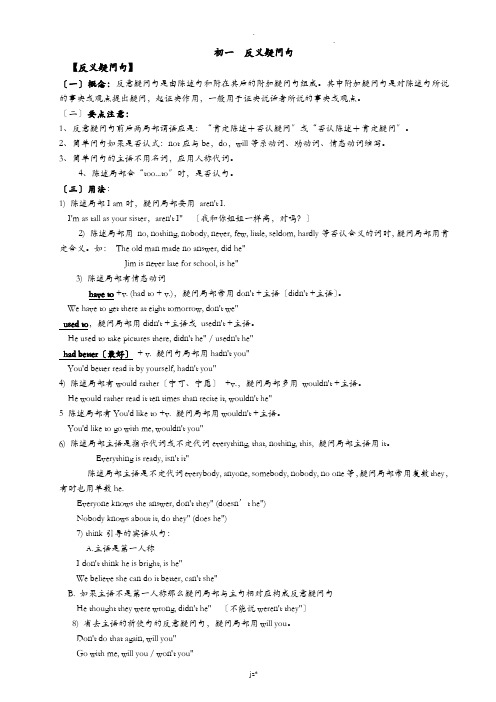
初一反义疑问句【反义疑问句】〔一〕概念:反意疑问句是由陈述句和附在其后的附加疑问句组成。
其中附加疑问句是对陈述句所说的事实或观点提出疑问,起证实作用,一般用于证实说话者所说的事实或观点。
〔二〕要点注意:1、反意疑问句前后两局部谓语应是:“肯定陈述+否认疑问〞或“否认陈述+肯定疑问〞。
2、简单问句如果是否认式:not应与be,do,will等系动词、助动词、情态动词缩写。
3、简单问句的主语不用名词,应用人称代词。
4、陈述局部含“too...to〞时,是否认句。
〔三〕用法:1) 陈述局部I am时,疑问局部要用aren't I.I'm as tall as your sister,aren't I" 〔我和你姐姐一样高,对吗?〕2) 陈述局部用no, nothing, nobody, never, few, little, seldom, hardly等否认含义的词时,疑问局部用肯定含义。
如:The old man made no answer, did he"Jim is never late for school, is he"3) 陈述局部有情态动词have to +v. (had to + v.),疑问局部常用don't +主语〔didn't +主语〕。
We have to get there at eight tomorrow, don't we"used to,疑问局部用didn't +主语或usedn't +主语。
He used to take pictures there, didn't he" / usedn't he"had better〔最好〕+ v. 疑问句局部用hadn't you"You'd better read it by yourself, hadn't you"4) 陈述局部有would rather〔宁可、宁愿〕+v.,疑问局部多用wouldn't +主语。
(完整版)反意疑问句的用法归纳
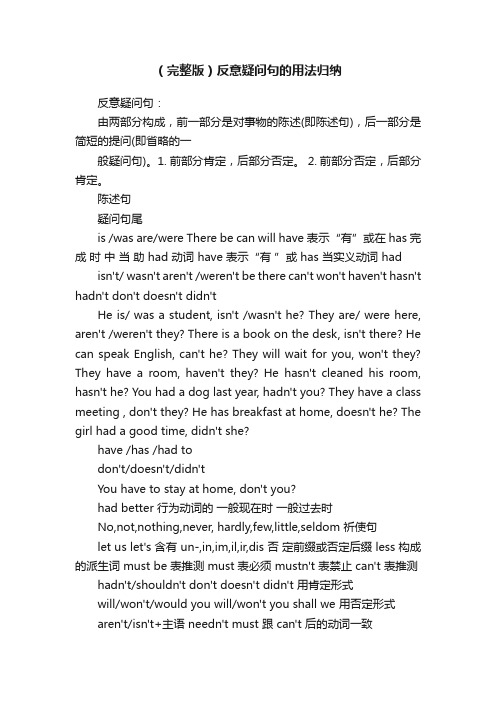
(完整版)反意疑问句的用法归纳反意疑问句:由两部分构成,前一部分是对事物的陈述(即陈述句),后一部分是简短的提问(即省略的一般疑问句)。
1. 前部分肯定,后部分否定。
2. 前部分否定,后部分肯定。
陈述句疑问句尾is /was are/were There be can will have 表示“有”或在 has 完成时中当助 had 动词 have 表示“有”或 has 当实义动词 had isn't/ wasn't aren't /weren't be there can't won't haven't hasn't hadn't don't doesn't didn'tHe is/ was a student, isn't /wasn't he? They are/ were here, aren't /weren't they? There is a book on the desk, isn't there? He can speak English, can't he? They will wait for you, won't they? They have a room, haven't they? He hasn't cleaned his room, hasn't he? You had a dog last year, hadn't you? They have a class meeting , don't they? He has breakfast at home, doesn't he? The girl had a good time, didn't she?have /has /had todon't/doesn't/didn'tYou have to stay at home, don't you?had better 行为动词的一般现在时一般过去时No,not,nothing,never, hardly,few,little,seldom 祈使句let us let's 含有 un-,in,im,il,ir,dis 否定前缀或否定后缀 less 构成的派生词 must be 表推测 must 表必须 mustn't 表禁止 can't 表推测hadn't/shouldn't don't doesn't didn't 用肯定形式will/won't/would you will/won't you shall we 用否定形式aren't/isn't+主语 needn't must 跟 can't 后的动词一致We'd better go now, hadn't/shouldn't we? They like playing football, don't they? He likes music, doesn't he? The woman bought a book, didn't she? He has hardly done his homework, has he? Please turn it on, will/won't/would you? Let us help him, will/won't you Let's have a rest, shall we? She dislikes it, doesn't she? You are unhappy, aren't you? You are hopeless, aren't you? He must be happy, isn't he ? You must do it today, needn't you? You mustn't talk like that, must you? He can't be a doctor, is he?I am 主从复合句 I think/believe/guess/ suppose+宾语从句并列句 used toaren't /ain't I; am I not I am your friend, aren't I一般跟主句一致He said she had been there, didn't he?动词和主语跟从句一 I think he'll come to help us, won't he? 致,用肯定还是否定 I don't think he is clever, is he? 根据主句来确定与邻近的分句一致Mary is here, but she was here just now, wasn't she?usedn't/didn'tHe used to be a teacher, usedn't/didn't he?5陈述句主语疑问句尾主语例句this, thatitThis is your brother, isn't it?These, thosetheyThese are not books, are they?oneone, heOne can't be always young, can one/he?something, anythingitNothing is serious, is it?everything, nothingEverything seems all right, doesn't it?everybody, everyoneEveryone knows this, don't they/doesn't he?somebody, someoneNobody likes to lose money, does he?anybody, anyonethey ,heNo one came , did they?nobody, no one,noneeither, neithereach ofthey ,heEach of the boys had an apple, didn't he /they?some(none) ofIt 或 they ,you None of the food was delicious, was it?Some of the men have come back, haven't they?or, and , neither…nor, either…or, both…and 复数代词Neither you nor I am wrong, are we? Both Tom and Jack came, didn't they?not only… but also not...but 等连接的并列主语不定式,动名词,从句或词组 the+ 形容词表示一类人 there 引起的句子it 复数代词 thereTo learn English well isn't easy, is it? Swimming is great fun,isn't it? The poor had no right to speak at that time, did they? There stands a house and a lot of trees, doesn't一、选择填空they? 6.--That's wrong, isn't it? -- ______1.Jim is a driver,_____?A. Yes, it is.B. Yes, it isn't.A. does heB. doesn't heC. is heD. isn't heC. No, it is.D. Yes, it was.2.You have a sports meeting every year,___? 7. Let's take a short rest, ______?A. have youB. do youA. do weB. aren't weC. haven't youD. don't youC. will youD. shall we3. He has never watched such an important8. Five-year-old children are too young to gomatch , _____ he?to school, ________ they?A. hasn'tB. hasC. isD. isn'tA. areB. aren'tC. wereD. have4.They have to work at once,______ they?9. Hundreds of people lost their lives in theA. haveB. haven'tC. doD. don'taccident,_______ they?5. She often feels tired,______ she?A. don'tB. didn'tC. doD. didA. doesn'tB. doesC. isD. isn't10.There isn't any bread on the table, ______?6A. isn't thereB. is thereC. has thereD. is it11. Mr King can not speak Chinese,____ he?A.doesn'tB. doesC. can'tD. can12. Lily didn't come to school, did she?____. She was ill in bed.A.No ,she didB. Yes , she did.C. No ,she didn't.D. Yes ,she didn't13.--She isn't a teacher, is she?--_____. She works in a hospital.A.No ,she isB. Yes , she is.C. No ,she isn't.D. Yes ,she isn't14.Lily looks like Lucy,_______?A. is LilyB. isn't sheC. does LillyD. doesn't she15.Tom often has lunch at school,_____?A. doesn't TomB. doesn't heC. does TomD. doesn't he16. Your family has no colour TV___it?A. hasn'tB. doesn'tC.isD. has17.You could hardly believe what he had said, _____ you?A. couldB. couldn'tC. canD. were18. --You don't smoke, do you?--______.A. Yes, I don'tB. No, I doC. No, I don'tD. Yes, I am.二、完成下列反意疑问句.1.You are late, ________ __________?2.He is on time,_________ _________?3.They were in the classroom just now,________ _________?4.She was ten years old last year_________________?5. They are going hiking next Sunday,________ _________?6.That cat is running up the tree.7.Ann is going to help me with my English8 There is some water in the bottle,___________________?9.There are many soldiers over there, _______ __________?10.He can skate, __________ ___________? 11.My parents can play chess,_____ ______? 12. They will work on the farm,________ _________? 13. My parents will visit my grandparents next Monday,________ _________? 14. They have written nine books since 1995,________ _________? 15, The woman has already found her son. ,________ _________? 16. They have three balls,_______ ______? 17. Jack has two sister,________ _______? 18.They have six classes every day,________ _________? 19.Tom has lunch at home,_____ _________?20.The students had a good time last Sunday,___________ ____________? 21. We have to finish it,______ ________? 22. The workers had to take the first bus, ________ _________? 23. You had better stay at home today, _________ __________? 24.We clean our classroom every day, ________ _________? 25. He watches TV on Saturday evening,________ _________? 26. The boys often play football on the playground,________ _________? 27.The singerswent to H.K yesterday, ________ _________? 28.They studied hard last year,________ _________? 29.They planted many trees last month,________ _________? 30.This pen is yours,_________ __________? 31.That was a wonderful film,______ _____?32.Everything is ready, ________ ________? 33.There is nothing wrong with the radio,___734.He did little homework yesterday, _______ __________?35.You'd like some coffee,______ ______? 36.Let's have a rest, _______ ____________? 37.Let us read the text, ________ ________?38.Don't read in bed, _________ _________? 39. Stop laughing,_______ __________? 40. He has to go there at eight,______ _____? 41.He has never been to Beijing, _____ ____? 42.She can hardly speak,_______ ________? 43.Few people know her here______ _____? 44.His mother was unhappy when she heard the news, _____ _______? 45.She dislikes watching football match____ ______? 46.He used to swim in the river,____ _____? 47.I think your brother is right, ____ ______?48. I don't think he will go there,____ _____?选择疑问句选择疑问句说话人对问题提出两个或两个以上的选项,让对方选择回答。
英语反义疑问句的14种常考特殊用法,备战中考一定要掌握!
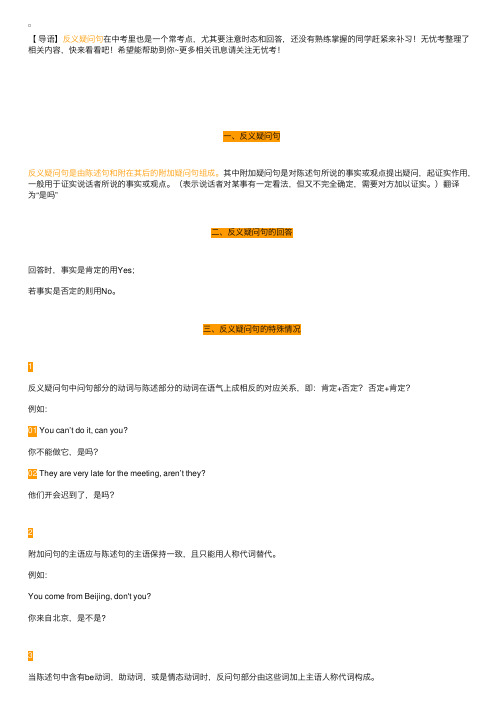
【导语】反义疑问句在中考⾥也是⼀个常考点,尤其要注意时态和回答,还没有熟练掌握的同学赶紧来补习!⽆忧考整理了相关内容,快来看看吧!希望能帮助到你~更多相关讯息请关注⽆忧考!⼀、反义疑问句反义疑问句是由陈述句和附在其后的附加疑问句组成。
其中附加疑问句是对陈述句所说的事实或观点提出疑问,起证实作⽤,⼀般⽤于证实说话者所说的事实或观点。
(表⽰说话者对某事有⼀定看法,但⼜不完全确定,需要对⽅加以证实。
)翻译为“是吗”⼆、反义疑问句的回答回答时,事实是肯定的⽤Yes;若事实是否定的则⽤No。
三、反义疑问句的特殊情况1反义疑问句中问句部分的动词与陈述部分的动词在语⽓上成相反的对应关系,即:肯定+否定?否定+肯定?例如:01 You can’t do it, can you?你不能做它,是吗?02 They are very late for the meeting, aren’t they?他们开会迟到了,是吗?2附加问句的主语应与陈述句的主语保持⼀致,且只能⽤⼈称代词替代。
例如:You come from Beijing, don't you?你来⾃北京,是不是?3当陈述句中含有be动词,助动词,或是情态动词时,反问句部分由这些词加上主语⼈称代词构成。
Be动词包括:am, is, are, was, were助动词有:do, does, did, have(⽤在完成时), has(⽤在完成时)等情态动词有:can, could, may, might, must, will, would, shall, should例如:01 He will go home, won’t he?他要回家了,是吗?02 She doesn’t like to eat popcorn, does she?她不喜欢吃爆⽶花,是吗?4have的不同⽤法,反义疑问句⽤不同的动词。
(1)have表“有”时,反义疑问句谓语动词⽤have/do都⾏。
反义疑问句知识点详解(初中英语专项复习)3

反义疑问句知识点详解(初中英语专项复习)一、定义反意疑问句又名附加疑问句。
属疑问句的一种,表示说话者对某事有一定看法,但又不完全确定,需要对方加以证实。
二、结构和原则:1.反意疑问句一般分为两个部分:前一个部分陈述句,后一部分为缩略形式的句问。
如:There is a tree in front of the building, isn’t there?2.反意疑问句遵守前肯后否, 前否后肯, 时态一致性的原则.三、用法:一.反意疑问句主语及谓语的确定.1.陈述部分含有never, few ,little,hardly,seldom,rarely(罕见), no,nothing, nobody, none, too…to 等表示否定意义的词时,其附加问句就用肯定形式.There are few people in the room, are there?She is too young to go to school, is she?2.陈述句部分是“There be…”结构时,疑问部分用“be there”.There is a tree in front of the building, isn’t there?There will not be any trouble, will there?3.陈述部分主语为this, that 等时,附加部分主语应用it.类似地,陈述部分主语为these, those等时,附加部分主语应用they.This is a beautiful picture, isn’t it?Those aren’t apple trees, are they?4.当陈述句部分动词为have(has)时有下列几种情况:(1)have在一般现在时中表示“有”之意,附加问句部分谓语可用“have”或用助动词do.Tom has a new watch, doesn’t he( hasn’t he)?(2) have to表示“不得不”“必须”之意时,附加问句部分谓语应用助动词do.Kate has to help her mother at home, doesn’t she?(3) have 表示“吃、喝、玩、度过”等意时,其附加问句的谓语应用助动词do.They have a good time in Beijing, don’t they?(4)have 在完成时中,其附加问句谓语动词应用have.Lucy has ever been to Japan, hasn’t she?(5) had better 最好,在祈使句中,其附加问句谓语动词应用hadYou had better clean the room,hadn’t you?5.肯定的祈使句的附加问句可用will you或won’t you,否定的祈使句的附加问句用will you.Listen to me carefully, will you?Don’t play with fire, will you?6.以let’s开头的祈使句,附加问句用shall we;而以let us 开头的祈使句,附加问句用will you.Let’s go to the park, shall we?Let us help you, will you?7.think, believe, expect, imagine, suppose等引导的宾语从句:A.主语是第一人称(应特别注意否定的转移)I don’t think he is bright, is he?We believe she can do it better, can’t she?B. 如果主语不是第一人称则疑问部分与主句相对应构成反意疑问句He thought they were wrong, didn’t he?8.否定前缀或后缀(否定前缀dis-, un-, im-或否定后缀-less,如dislike, discourage, unfair, unable等)不能视为否定词,其反意疑问句仍用否定形式。
初中英语反意疑问句的知识点
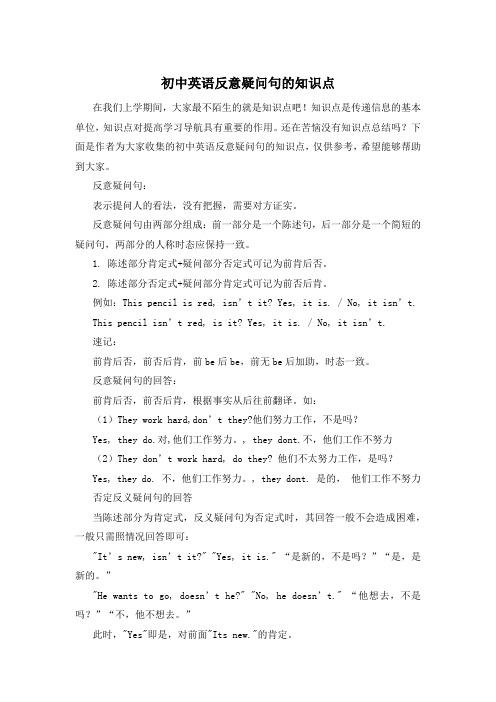
初中英语反意疑问句的知识点在我们上学期间,大家最不陌生的就是知识点吧!知识点是传递信息的基本单位,知识点对提高学习导航具有重要的作用。
还在苦恼没有知识点总结吗?下面是作者为大家收集的初中英语反意疑问句的知识点,仅供参考,希望能够帮助到大家。
反意疑问句:表示提问人的看法,没有把握,需要对方证实。
反意疑问句由两部分组成:前一部分是一个陈述句,后一部分是一个简短的疑问句,两部分的人称时态应保持一致。
1. 陈述部分肯定式+疑问部分否定式可记为前肯后否。
2. 陈述部分否定式+疑问部分肯定式可记为前否后肯。
例如:This pencil is red, isn’t it? Yes, it is. / No, it isn’t.This pencil isn’t red, is it? Yes, it is. / No, it isn’t.速记:前肯后否,前否后肯,前be后be,前无be后加助,时态一致。
反意疑问句的回答:前肯后否,前否后肯,根据事实从后往前翻译。
如:(1)They work hard,don’t they?他们努力工作,不是吗?Yes, they do.对,他们工作努力。
, they dont.不,他们工作不努力(2)They don’t work hard, do they? 他们不太努力工作,是吗?Yes, they do. 不,他们工作努力。
, they dont. 是的,他们工作不努力否定反义疑问句的回答当陈述部分为肯定式,反义疑问句为否定式时,其回答一般不会造成困难,一般只需照情况回答即可:"It’s new, isn’t it?" "Yes, it is." “是新的,不是吗?”“是,是新的。
”"He wants to go, doesn’t he?" "No, he doesn’t." “他想去,不是吗?”“不,他不想去。
初中英语反义疑问句的用法与例句知识点

初中英语反义疑问句的用法与例句知识点在咱们初中英语的学习中啊,反义疑问句这个知识点可真是让人又爱又恨。
今天,我就来给大家好好说道说道。
先来说说啥是反义疑问句。
简单来讲,就是在一个陈述句后面再加上一个简短的问句,用来确认或者求证前面陈述句所说的内容。
比如说,“You are a student, aren't you?” 这里前面说“你是个学生”,后面就问“不是吗”。
那反义疑问句的构成是咋样的呢?一般来说,就是“陈述句+简短问句”。
这个简短问句由“助动词/情态动词/be 动词+主语(人称代词)”构成。
而且要注意哦,前肯后否,前否后肯。
啥意思呢?就是前面陈述句是肯定的,后面问句就得是否定的;前面陈述句是否定的,后面问句就得是肯定的。
举个例子哈,“He likes music, doesn't he?” 前面说“他喜欢音乐”是肯定的,后面就问“不是吗”,用否定“doesn't he”。
再比如,“She isn't beautiful, is she?” 前面说“她不漂亮”是否定的,后面就得问“漂亮吗”,用肯定“is she”。
还有啊,反义疑问句的回答也有点讲究。
别看到后面的问句是否定的,就晕头转向。
回答的时候,根据实际情况来,是就是“yes”,不是就是“no”,别管问句是肯定还是否定。
比如说,有人问你“You are fromChina, aren't you?” 如果你确实来自中国,那就回答“Yes, I am” 可别因为后面是“aren't you”就搞糊涂啦。
我还记得我上初中那会,有一次英语课上,老师正在讲反义疑问句。
当时老师举了个例子,“You have finished your homework, haven't you?”然后老师就点了我同桌起来回答。
我那同桌啊,平时英语就不太好,站起来一脸懵。
支支吾吾半天,最后来了一句:“I don't know” 全班同学都笑了,老师也哭笑不得,又给他耐心地解释了一遍。
英语中反义疑问句的用法归纳

英语中反义疑问句的用法归纳反义疑问句用法归纳一、基本概念反义疑问句由两部分组成:前一部分是一个陈述句,后一部分是一个简短的疑问句,两部分的人称和时态应保持一致。
二、基本用法1. 肯定陈述句 + 否定疑问句例如:You like music, don't you? (你喜欢音乐,不是吗?)2. 否定陈述句 + 肯定疑问句例如:He doesn't like sports, does he? (他不喜欢运动,是吗?)3. 祈使句 + 反义疑问句(1)Let's 开头的祈使句,用 shall we?例如:Let's go for a walk, shall we? (我们去散步,好吗?)(2)Let us 开头的祈使句,用 will you?例如:Let us have a rest, will you? (让我们休息一下,好吗?)(3)其他祈使句,用 will you?例如:Open the door, will you? (打开门,好吗?)4. 含有 must 的反义疑问句(1)must 表示“必须”时,用 needn't例如:You must finish your homework today, needn't you? (你今天必须完成作业,不是吗?)(2)must 表示推测“一定,肯定”时,根据实际情况而定例如:He must be very tired, isn't he? (他一定很累了,不是吗?)5. 含有否定词的反义疑问句当陈述句中有 never, few, little, nothing, nobody 等否定词时,反义疑问句用肯定形式。
例如:There is nothing in the box, is there? (盒子里什么都没有,是吗?)三、固定搭配1. “I am + 表语”,反义疑问句用“aren't I”例如:I'm late, aren't I? (我迟到了,不是吗?)2. 陈述部分是“there be”结构,反义疑问句用“be there”例如:There is a book on the desk, isn't there? (桌子上有一本书,不是吗?)3. 当陈述部分主语是不定代词 everyone, somebody, nobody, everyone 等时,反义疑问句用 they 或 he例如:Everyone is here, aren't they? (大家都在这儿,不是吗?)4. 当陈述部分主语是 this, that 时,反义疑问句用 it;当陈述部分主语是 these, those 时,反义疑问句用 they例如:This is a pen, isn't it? (这是一支钢笔,不是吗?)5. 当陈述部分是主从复合句时,反义疑问句与主句的主语和谓语保持一致例如:He said he would come, didn't he? (他说他会来,不是吗?)双语例句:1. I have a lot of friends, don't I? (我有很多朋友,不是吗?)2. She doesn't speak French, does she? (她不会说法语,是吗?)3. Have a cup of coffee, will you? (喝杯咖啡,好吗?)4. We should study hard, shouldn't we? (我们应该努力学习,不是吗?)5. They have been to Beijing, haven't they? (他们去过北京,不是吗?)6. You aren't a doctor, are you? (你不是医生,对吧?)7. There are some apples on the tree, aren't there? (树上有一些苹果,不是吗?)8. Nobody knows the answer, do they? (没人知道答案,对吧?)9. This isn't your book, is it? (这不是你的书,对吧?)10. Those are beautiful flowers, aren't they? (那些是漂亮的花,不是吗?)11. He can swim very well, can't he? (他游泳游得很好,不是吗?)12. She never tells lies, does she? (她从不说谎,对吧?)13. We had a great time yesterday, didn't we? (我们昨天玩得很开心,不是吗?)14. If it rains tomorrow, we won't go hiking, will we? (如果明天下雨,我们就不去徒步了,对吧?)15. You think he is right, don't you? (你认为他是对的,不是吗?)16. Mary has few friends here, does she? (玛丽在这儿几乎没朋友,对吧?)17. The boy doesn't like vegetables, does he? (这男孩不喜欢蔬菜,是吗?)18. Everyone wants to be happy, don't they? (每个人都想快乐,不是吗?)19. I'm a good student, aren't I? (我是个好学生,不是吗?)20. He told you the truth, didn't he? (他告诉你真相了,不是吗?)。
2024年初中英语语法一轮复习之反义疑问句用法归纳
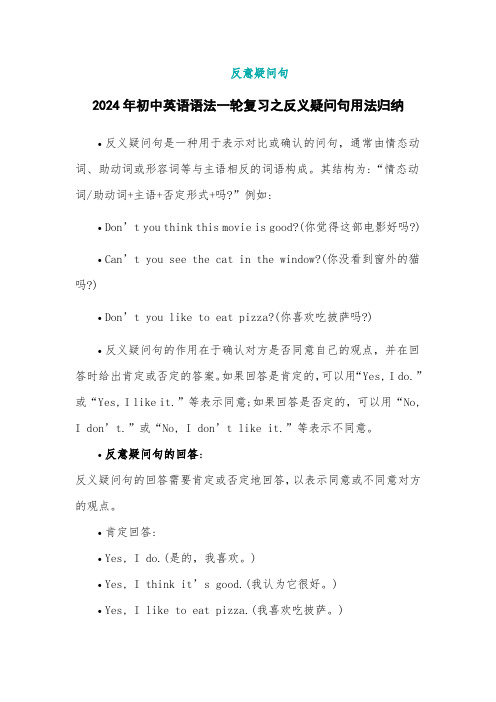
反意疑问句2024年初中英语语法一轮复习之反义疑问句用法归纳•反义疑问句是一种用于表示对比或确认的问句,通常由情态动词、助动词或形容词等与主语相反的词语构成。
其结构为:“情态动词/助动词+主语+否定形式+吗?”例如:•Don’t you think this movie is good?(你觉得这部电影好吗?) •Can’t you see the cat in the window?(你没看到窗外的猫吗?)•Don’t you like to eat pizza?(你喜欢吃披萨吗?)•反义疑问句的作用在于确认对方是否同意自己的观点,并在回答时给出肯定或否定的答案。
如果回答是肯定的,可以用“Yes, I do.”或“Yes, I like it.”等表示同意;如果回答是否定的,可以用“No, I don’t.”或“No, I don’t like it.”等表示不同意。
•反意疑问句的回答:反义疑问句的回答需要肯定或否定地回答,以表示同意或不同意对方的观点。
•肯定回答:•Yes, I do.(是的,我喜欢。
)•Yes, I think it’s good.(我认为它很好。
)•Yes, I like to eat pizza.(我喜欢吃披萨。
)•否定回答:•No, I don’t.(不,我不喜欢。
)•No, I don’t think it’s good.(不,我觉得它不好。
)•No, I don’t like to eat pizza.(不,我不喜欢吃披萨。
) •需要注意的是,在回答反义疑问句时,应该使用正确的语法和标点符号,以确保回答的准确性和清晰度。
回答反义疑问句的原则回答反义疑问句的原则是:肯定回答用“Yes, I do.”或“Yes, I think it’s good.”等表示同意;否定回答用“No, I don’t.”或“No, I don’t think it’s good.”等表示不同意。
- 1、下载文档前请自行甄别文档内容的完整性,平台不提供额外的编辑、内容补充、找答案等附加服务。
- 2、"仅部分预览"的文档,不可在线预览部分如存在完整性等问题,可反馈申请退款(可完整预览的文档不适用该条件!)。
- 3、如文档侵犯您的权益,请联系客服反馈,我们会尽快为您处理(人工客服工作时间:9:00-18:30)。
反义疑问句(1)反意疑问句要点简述反意疑问句又叫附加疑问句,是在陈述句后,对陈述句所叙述的事实提出的疑问。
其基本结构有两种:一是“肯定陈述句+简略否定问句”;二是“否定陈述句+简略肯定问句”。
反意疑问句后一部分的主谓与前一部分的主谓要保持人称及助动词等方面的一致。
这种疑问句的回答要根据事实,肯定的用“Yes, …”。
否定的用“No, …”。
如:It looks like rain, doesn’t it?He doesn’t need to work so late, does he?(2)学习反意疑问句,特别要注意的问题1)陈述部分的主语是this, that时,疑问部分的主语多用it;陈述部分的主语是these, those时,疑问部分的主语多用they。
如:This is a dictionary, isn’t it?Those are shelves, aren’t they?2)陈述句如果是there be结构时,疑问句部分仍用there。
如:There once was a man named Saint Nicholas, wasn’t there?3)在英语口语中,“I am +表语结构”,后面的反意疑问句多用aren’t I来体现。
如:I am very interested in learning English, aren’t I?4)陈述句的主语是动词不定式,动词的-ing形式或从句时,疑问部分的主语多用it来体现。
如:Taking care of our environment is very important, isn’t it?What he said is right, isn’t it?5)陈述句中含有not, no, hardly, neither, never, few, little, too …to等否定词或具有否定意义的词时,疑问部分常用肯定形式。
如:Few people knew the news, did they?Tom has never been to England , has he?但陈述句中如果带有否定意义的前缀和后缀的单词时,整个句子仍视为肯定句,反意疑问部分多用否定形式。
如:She is unhappy, isn’t she?6)陈述句的主语是nobody, no one, everyone, somebody等不定代词时,反意疑问部分的主语多用they(当强调全体时)或he(当强调个体时)。
如果陈述句的主语是something, nothing, anything, everything等不定代词时,反意疑问部分的主语多用it。
如:No one knows him, do they?Someone is waiting for you, isn’t he?Nobody says a word about the accident, do they?Everything seems all right, doesn’t it?7)陈述句是主从复合句时,如果主句的谓语动词是think, believe, expect, feel, guess等词,且主语是第一人称I或we时,反意疑问部分的人称、时态与宾语从句保持一致,同时还要考虑到否定的转移(否定前移)。
如:I believe that the boy can get a ticket for you, can’t he?I don't think he is bright, is he?We believe she can do it better, can't she?若是第二第三人称的话,反义疑问句应该看主句:She thought it is meaningless,didn't she?如果是转述的要注意:He said that you were in hospital,weren't you?(这里是对着那个you说的)8)祈使句的反义疑问句中:let's 的要用shall we;let us 的要用will you;其他形式的都用will you。
如:Go and get it for me, won't you?去帮我取个东西,好吗?Let's meet at the airport, shall we ? 我们在机场碰头,行不行?Have a little more wine, will you ? 喝点儿酒,好吗?9)must的反义疑问句:陈述部分有must 的疑问句,疑问部分根据实际情况而定。
A.must表示“应该”,其疑问部分用mustn't(不应该),如:You must work hard next term, mustn't you ? 下学期你应该努力学习,对吗?B.must表示“必须”,其疑问部分用needn't(不必),如:They must finish the work today, needn’t they? 他们今天必须要完成这项工作,是吗?C.陈述部分含情态动词mustn't,表示禁止时,疑问部分就可以用must或may,如:You mustn’t stop your car here, must you? (may we?)你不能把车停在这地方,知道吗?D.must表示推测,其疑问部分必须与must 后面的主要动词相呼应。
如:①对现在动作或存在的情况的推测:You must know the answer to the exercise, don't you? 你一定知道这项练习的答案,是不是?That must be your bed, isn't it? 那一定是你的床,是吗?②对过去发生的动作或存在的情况的推测:句中陈述部分没有表示过去的时间状语,这时疑问部分中的动词就用现在完成时。
(haven’t / hasn’t + 主语)You must have told her about it, haven’t you? 你一定把这事告诉她了,是吗?10)have作为动词的反义疑问句:①have to 的短语,且只充当一般动词的作用,助动词为do,does,和普通的一般疑问句没有任何差别,提问还是用do,does引导。
We have to finish it ,don't we?②当用have,has做助动词的时候,疑问句才用它们引导,如:She has seen it,hasn't she?这里的助动词就是has③当陈述部分有had better,或其中的have表示完成时态时,疑问句应用hadn’t等开头:You’d better get up early, hadn’t you?④其他情况句中有have时疑问句应用don't等开头;如have表示“有”的时候,有两种形式:do或haveHe has two sisters,doesn't he? =He has two sisters,hasn't he?He doesn't have any sisters, does he?⑤当must+have done表示对过去的情况进行推测(一般句中有明确的过去时间状语),问句要根据陈述部分谓语的情况用“didn't+主语”或“wasn't/weren't+主语”;如果强调动作的完成(一般没有明确的过去时间状语),问句要用“haven't/hasn't+主语”。
She must have read the novel last week,didn't she? 她上星期一定读了这本小说,是吗?You must have told her about it, haven't you?你一定把这事告诉她了,是吗?11)带情态动词dare或need的反意疑问句,疑问部分常用need (dare ) +主语。
We need not do it again, need we ?He dare not say so, dare you?当dare, need 为实义动词时,疑问部分用助动词do + 主语。
She doesn't dare to go home alone, does she?12)感叹句中,疑问部分用be +主语。
What colours, aren't they?What a smell, isn't it?13)陈述部分由neither…nor, either…or 连接的并列主语时,疑问部分根据其实际逻辑意义而定。
Neither you nor I am engineer, are we?14)陈述部分的谓语是wish,疑问部分要用may +主语。
I wish to have a word with you, may I?15)含有ought to 的反意疑问句,陈述部分是肯定的,疑问部分用shouldn't / oughtn't +主语。
He ought to know what to do, oughtn't he? / shouldn't he?16)陈述部分的谓语是used to 时,疑问部分用didn't +主语或usedn't +主语。
He used to take pictures there, didn't he? / usedn't he?17)陈述部分有would rather +v.,疑问部分多用wouldn't +主语。
He would rather read it ten times than recite it, wouldn't he?18)陈述部分有You'd like to +v. 疑问部分用wouldn't +主语。
You'd like to go with me, wouldn't you?对反意疑问句的回答,无论问题的提法如何,如果事实是肯定的,就用yes,事实是否定的,就要用no。
要特别注意陈述句部分是否定结构,反意疑问句部分用肯定式提问时,回答yes或no与汉语正好相反。
这种省略回答的yes要译成“不”,no要译成“是”。
例---He likes playing football, doesn’t he? 他喜欢踢足球,是吗?---Yes, he does. / No, he doesn’t. 是的。
